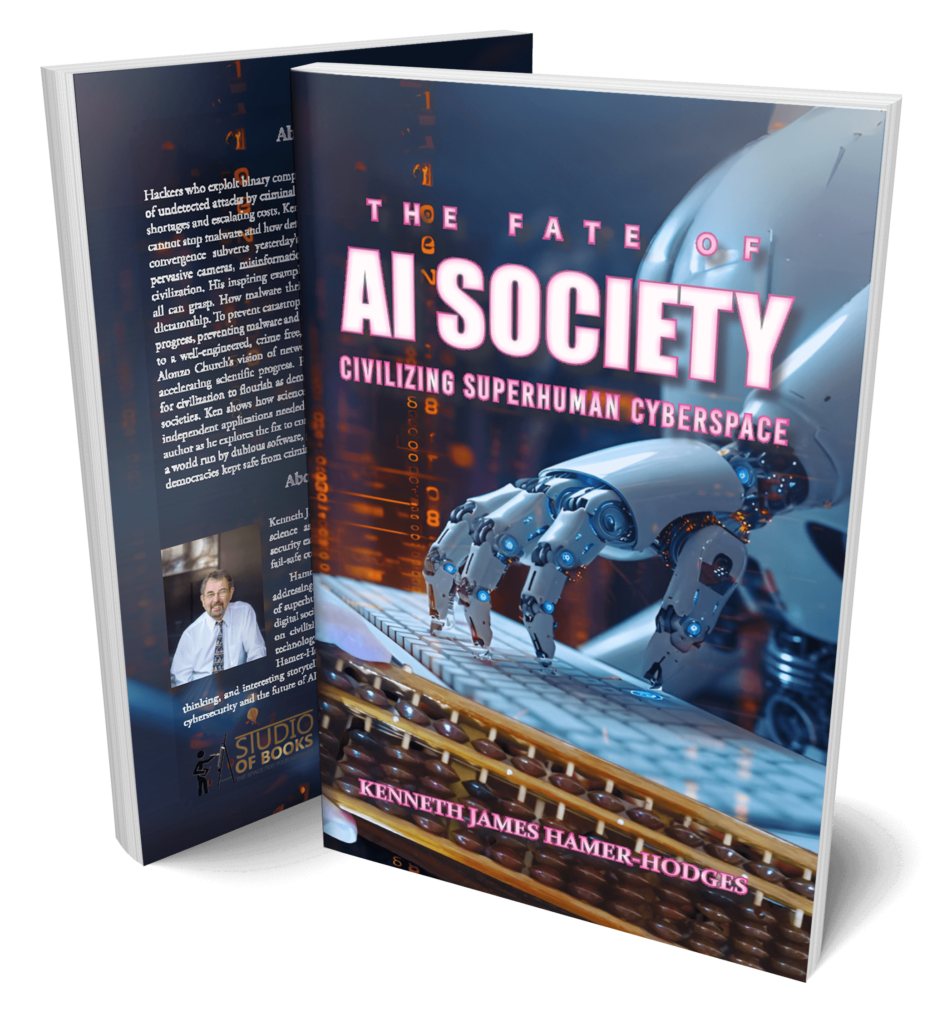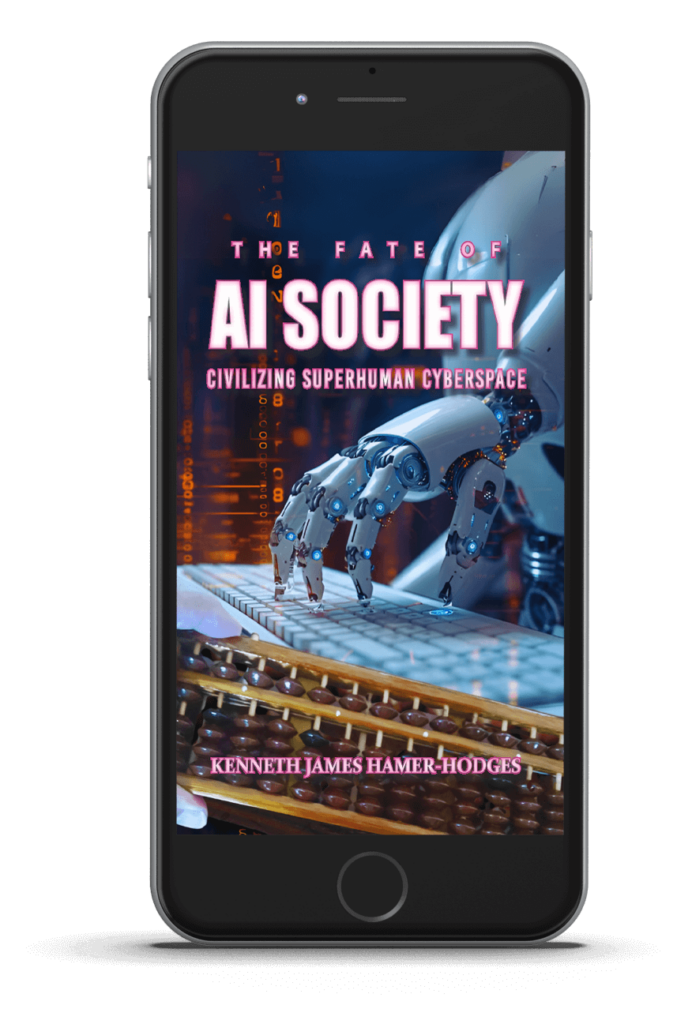
About The Book
The Fate Of AI Society
Civilizing Superhuman Cyberspace
Hackers who exploit binary computers become expert cybercriminals. A vicious cycle of undetected attacks by criminal gangs, spies, and foreign enemies fuels skilled staff shortages and escalating costs. Ken Hamer-Hodges, explains why outdated computers cannot stop malware and how democracy is undermined by corrupt dictators. Digital convergence subverts yesterday’s binary computer, allowing advanced malware, pervasive cameras, misinformation, AI, and deep-fakes to destroy our culture and civilization. His inspiring examples explain the perfection of computer science that all can grasp. How malware thrives and why operating systems lead to Orwellian dictatorship. To prevent catastrophe computer hardware must catch up with software progress, preventing malware and stopping AI breakout. He explains how to transition to a well engineered, crime free, global cybersociety. How machine code achieves Alonzo Church’s vision of networked function abstractions that avoid disaster by accelerating scientific progress. Plotting the path for radical improvement is vital for civilization to flourish as democratically controlled, AI-empowered, global cyber societies. Ken shows how science drives high performance with high reliability for independent applications needed in a world run by superhuman software. Join the author as he explores the fix to computer science. He shows how nations can thrive in a world run by dubious software, governed by superhuman AI, working as functional democracies kept safe from criminals, spies, and dictators.
Available At

Eman Afzal
In “The Fate of AI Society,” Kenneth James Hamer-Hodges addresses the shortcomings of existing binary systems and offers a ground-breaking substitute, offering a compelling vision for the future of computing. Through the use of eloquent language and a thorough grasp of computer science, Hamer-Hodges offers an insightful examination of the Dream Machine idea. The book’s strength is in how well it articulates the issues with conventional binary computers. With meticulous attention to detail, Hamer-Hodges analyses the weaknesses of current systems, including shared virtual memory constraints, malware vulnerability, and the existence of a centralised superuser. He persuasively argues in favour of the Dream Machine model adoption using a well-organized case.
Amazon Book Review of
The Fate Of AI Society
Civilizing Superhuman Cyberspace


Diana Lowery
The title caught my attention as AI Technology is a very current topic. I appreciate the author’s goal to write this in a style that “everyone can grasp.” It is not an easy read, but it is worth the effort.

Komal Phartyal
The book “The Fate of AI Society” by Kenneth James Hamer-Hodges explores the relationship between surveillance, democracy, and digital technology and argues in favor of decentralization and privacy protection. The book offers answers based on λ-calculus and ethical principles, while cautioning against digital authoritarianism through insights from computer history to contemporary cyber risks. It is well edited, perceptive, and deserving of five stars.

About The Book
Civilizing Cyberspace
The Fight For Digital Democracy
The subject of cybersecurity is too dry, while a readable text is too short. Instead, I hope to provoke a loud debate on the future and the urgent need for Industrial Strength Computer Science. Everyone is involved; damaging cyber-society by accident in the pre-electronic age was never cataclysmic. However, the critical flaws in the vital technology of the electronic age will destroy 21st Century civilized society.
The General-Purpose Computer is the enemy. It changes the grand experiment of free society and American justice. Law and order cannot be run by super-intelligent malware in Life 3.0 if super-human software roams wild. Cyber democracy only exists if citizen users hold the keys to privacy and security in cyberspace.
Within a decade, software automation in every conceivable form will dominate life in the globally interconnected electronic village of the 21st Century. However, this global village is ruled by the pre-electronic age of General-Purpose Computer Science. For cyber society to survive the software must be trusted. A Church-Turing Machine responds to this challenge; it is the proven way to guarantee trusted software throughout cyberspace, using an electronic age architecture from the Church-Turing Thesis.
General-Purpose Computer Science began in the pre-electronic age of WWII and the Cold War. It grew like Jekyll and Hyde into an international weapon of mass destruction disguised as a recreational stimulant. Through digital convergence, this WMD is already in the hands of envious criminals and hostile enemies. The added threat of a breakout by super-intelligent malware creates scenarios which are too horrific to contemplate.
The point of singularity is near . Artificially Intelligent Malware is both unspeakable and unstoppable, it is already in use and a solution is needed urgently. Industrial Strength Computer Science as Church-Turing Machines has become a national priority.
Available At

About The Book
Winning World War III
Industrial Strength Computer Science
Winning World War III by Kenneth James Hamer-Hodges examines the challenges facing modern computer science. The focus is the cost of cybersecurity and is the third book in a trilogy about Industrial Strength Computer Science. This volume addresses the global Cyber Warfare between democratic societies and authoritarian regimes. Ken delves into the shortcomings of traditional binary computers and proposes how “Industrial Strength Computer Science” ensures the survival of democracies in the digital age. Through a mix of historical context, technical detail, and futuristic vision, Hamer-Hodges argues for a complete overhaul of computer hardware to solve cybersecurity using the science of Alonzo Church to encapsulate the Turing Machine as expressed by the Church-Turing Thesis. It is a compelling story blending technical depth and a clear message. It discusses the limitations of binary computers and points out the real-world consequences of straying from science. The CrowdStrike freeze in 2024, exemplifies the global disruption that faces industrial society. The imagery of these failures with a detailed critique of malware, hacking, and ransomware drives home the fragility of cyberspace we rely on every day. The solution is to implement the Church-Turing Thesis using the science of the Lambda Calculus. It is bold and revolutionary, but also practical when recognized as a fight for survival. Ken explains the technical and theoretical concepts, including the λ-calculus and symbolic computation you will find fascinating. However, those with an interest in the future of Cyber society will appreciate the thoroughness with which each topic is addressed. It leads to the book’s philosophical tone when discussing the future of democracy in cyberspace. Hamer-Hodges links the survival of democratic ideals to technological evolution, highlighting how centralization in binary cyberspace leads to Orwellian dictatorships. His passionate defense of decentralization and the simple solution is a fresh perspective on how computer technology intersects with politics and the progress or failure of civilization. Ken’s comparisons between failing computer systems and the fall of democratic institutions are chilling, and it makes the stakes of this book feel very real. Winning World War III is a thought-provoking and detailed exploration of the future of cybersecurity and its political ramifications. If you are a technologist, policy-maker, or a concerned citizen then this book is a must-read.







